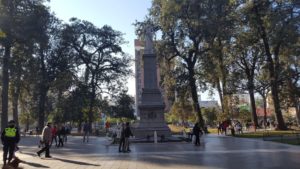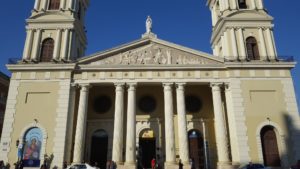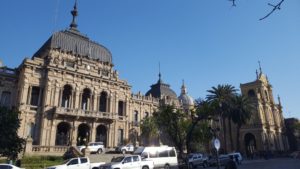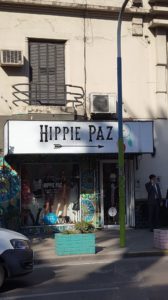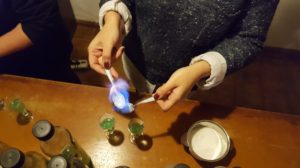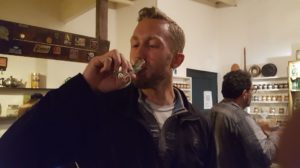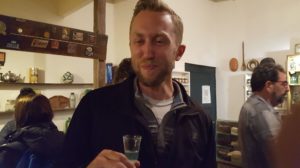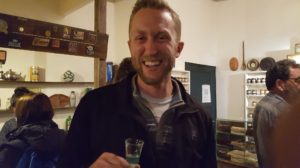The bus ride to San Miguel de Tucuman took five hours and arrived at 7pm. Again, the scenery during the ride, zigzagging up across desolate rocky desert plateaus down through ripe wine valleys, was incredible. Northwest Argentina certainly is beautiful.

I didn’t feel like immediately catching an overnight bus to Mendoza, so decided to stay a day or two in Tucuman and see what the city has to offer. I looked up a hostel on my phone that was only about 20 blocks away and set out on foot. About two blocks from the train station, the city didn’t seem too inviting. The block or two that surround a bus terminal in South America are usually hectic with lots of vendors, hawkers, and street people about, but the area I was walking through seemed different, dodgier. More haggard people hanging around idly and drinking from bottles on the curb. Normally, I give my fellow humans the benefit of the doubt and don’t worry when passing through a dodgy area, but I suddenly got the feeling I shouldn’t be walking here with my backpacks, making me an easy target. You have to listen to your gut. I flagged down a passing taxi and quickly hopped in.
Fifteen minute later, after the taxista gave me the long haul (or ‘accidentally’ made three wrong turns), I arrived at Tucuman Backpacker’s Hostel. I popped inside and the place looked decent enough. At check in, the receptionist informed me this hostel has a house chef that makes dinner every night. Of the dozens of hostels I’ve stayed during my travels, I’ve never encountered one with a house chef and dinner included, so this was a welcome surprise. Of course, dinner wouldn’t be until 10pm as is customary in Argentina. I was already hungry, so I headed out to find something to snack on.
I stopped at a small wine shop and bought some salami and cheese. This is one of the best parts about Argentina—at nearly every supermarket, wine store, and even small corner stores you can find high quality, fresh, handmade charcuterie and cheese. The meat is usually naturally cured using just salt. No nitrates. Incredible. I headed back to the hostel and hung out on the patio reading, having an Imperial (common Argentine beer, really good), and eating salami and cheese. Life is good.
Finally, dinner was ready. A group of five Argentine guys descended on the patio and sat down at the main dining table. There was one seat left, so I asked if I could join, and they said yes. They all knew each other and were on vacation from Rosario. They didn’t really engage me or include me in the conversation, and every time I asked a question it seemed like an offensive interjection that they answered quickly and then went back to chatting among themselves. It was a bit of an awkward dinner for me. That’s how hostel life goes sometimes. It’s not always rainbows and butterflies. Usually, other travelers are cool and always enjoy including others in any activity, but sometimes you’re the third wheel. Oh well, I tried.
After dinner, I was already tuckered out and went to lay down and research what to do in Tucuman.
The next day, I had breakfast with an interesting Argentine girl. She was a microbiologist who studies soil microorganisms attending a conference in Tucuman. We had a nice conversation about soil fertility and evil Monsanto.
I spent the rest of the morning walking around Tucuman. It didn’t seem to be the most remarkable city. Aside from normal sites in cities in South America (main plaza, cathedral, basilica), there wasn’t a ton to do or see except for La Casa de Independencia (the house where the Argentine declaration of independence was signed) and a huge, lovely park, Parque 9 de Julio.
I decided to head to the bus station and see what my options were for a bus to Mendoza. I bought a ticket for an overnight bus leaving at 8pm.
I arrived back at my hostel at noon, and informed the receptionist I would be checking out. I asked if I could store my bags until the evening while I went to the park and a café. They told me I had to be out by noon and if I wanted to use their facilities longer I’d have to pay for half a night. Fuck that. I packed up all my stuff and walked to the park and hung out under a tree writing and napping until 4:30pm. I then went to the bus station and hung out in a restaurant writing, having dinner and a couple of beers and watching PGA tour golf until 8pm.
The bus arrived in Mendoza the next morning at 10am. I grabbed my stuff and hoofed it 10 minutes to Mora International Hostel. I immediately headed out to take the free walking tour of the city. It was just me and two British girls for the tour. Our guide Diego knew so much about the history of Mendoza and Argentina that it was information overload at nearly every stop we made, but it was still good to understand the background of the country.
Mendoza is the wine capital of Argentina. It’s located at the eastern foot of the Andes mountains near the central western border of Argentina. The city is home to more than 150,000, but feels even smaller as there are no tall buildings due to the threat of frequent earthquakes. Hundreds of wineries surround the city, taking advantage of the unique combination of fertile alluvial soil, altitude, and temperate semi-arid climate that makes it a prolific wine grape growing region. The Malbec wine produced around Mendoza is considered the best in the world. Tourists flock to the city both for the wine culture and adventure sports in the nearby Aconcagua (the highest mountain in the world outside of Asia) mountain range.
Afterward the tour, I stopped at Silla 13, recommended by Diego for great coffee, which it was, but they charged >$6 for a small French press. Get real bros. I spent another hour or so walking around the city, stopping at the four plazas (Plaza Chile, Espana, Italia, Peru) and wandering the pedestrian streets. For a city that looks big on a map, I felt like I had covered almost the entire city in about 4.5 hours of walking around.

I returned to the hostel for a short siesta while waiting for Argentine dinner time (9pm earliest). In the evening I met Jose, a volunteer at the hostel originally from Houston who had lived in Chicago for three years before leaving to travel. His mother is Mexican, so he had also spent some time living in Mexico and speaks fluent Spanish. We quickly became buddies. We went out to a parilla (grill restaurant), where I had another steak covered in mushrooms and Malbec sauce (seems to be the house specialty at most restaurants in Argentina) and cups of Malbec and Cabernet.
Afterwards, Jose and I shared another bottle of red back at the hostel before I was too drowsy and had to pass out.
The next day, I took a morning constitutional. Just like in Salta, nearly everything in town was shut down on Sunday morning. The city was like a ghost town, just me and a few viejos out meandering about. I managed to find a tienda that was open. It was filled with about 20 people (good business sense by the owner). I grabbed groceries and headed home. I practiced yoga on the patio in the grey, cold morning before making an elaborate breakfast and starting my Sunday poker grind.
In the evening, Jose ordered a delivery of three dozen empanadas from the only restaurant open in town, and insisted I eat some. I gladly obliged, while he watched me play on my laptop. I had 10+ cashes and one final table, but nothing went my way in the end and I only managed a small profit on the day. The run bad continues.
The next morning, I again made a huge, elaborate breakfast that would make Hunter S. Thompson proud, and then spent a few hours reading and writing.
In the afternoon, I went on a Mendoza wine tour. When I got picked up in the tour van, I sat next to Claire from Oakland. We were buddies for the tour and goofed around juvenilely most of time. The tour stopped at two wineries, an olive farm/olive oil factory (another major export of Argentina from the Mendoza region), and a homemade chocolate and liqueur shop. Guides at the wineries showed us the wine fields (not much to see since it’s winter), the presses, tanks, and casks while explaining the process. At the end we had wine tastings. The wines were good, but I have to gripe that they gave us too little. When I booked the tour, I was told I would be good and buzzed by the end, but we only received about two cups worth of wine from six different samples at the two wineries combined. Meh. The olive oil tour was similar, explaining the process and samples. The chocolateria was mostly just a sales pitch—no explanation of the process, just samples. One of the handmade liqueurs offered as sample was absinthe, which I, of course, opted for. They prepared the shot by lighting the absinthe on fire and then using the flame to heat a spoon and melt sugar which was then mixed in. The absinthe burned going down, so had to be sipped supper slowly. Like a good tourist, I bought things at each of the stops (a bottle of Malbec, a bottle of garlic olive oil, and 80% dark chocolate). The prices were really good considering the quality of the items.

Back at the hostel, I spent the evening hanging with Jose and a group of six Argentines while communally drinking beer and eating empanadas. The Argentines didn’t speak any English, so everything was in Spanish. Argentine Spanish, or Rioplatense, is a very different dialect of Spanish, almost Italian. While I can normally follow Spanish fairly well, I was lost for a lot of the conversation. I was sitting there feeling dejected about my Spanish speaking abilities after a year of travel in Latin America, when Jose turned to me and told me he was completely lost as well. He explained when he’s talking to one or two Argentines directly, he can understand perfectly, but when they’re in a group, all going off high-speed at once, he struggled. Even Jose, a fluent Spanish speaker, was having trouble with Rioplatense, which made me feel a lot better.
The next day, I spent the day hanging out in the central park of Mendoza reading, and sitting in a café doing some writing and daydreaming. In the evening, Valentina, another volunteer at the hostel from Argentina, Jose, and I spent the night hanging out and drinking red wine while snacking on salami, queso colorada, pancito y aceite de olivia, almost like we’re in Italy. We watched a couple of episodes of Rick and Morty in Spanish, but I don’t think the humor translated well and Jose who’d never seen the show before seemed to agree.
The next morning, I decided it was time to get a move on. I headed to the bus early in the morning to buy a ticket across the border to Santiago, Chile. At the bus station, I received the news that the border was closed due to snow. There are only a few mountain-passes in the entire length of the Andes between Argentina and Chile. The only route from Mendoza to Santiago crosses the border through a pass high in the mountains that is difficult to cross when there is snow. I was told to come back the following day to see if the mountain pass was opened.
I spent the rest of the day just like the last, hanging out in a café, wandering Mendoza, and drinking red wine and hanging with the crew at the hostel all night.
The next day, I went to the bus station at 8am. The lady at the bus station informed me that the situation had worsened. There were several inches of snow overnight and more bad weather forecasted, and now the authorities were projecting the border to be closed until Sunday, depending on how fast work crews could clear the snow and the weather.
It was Thursday, and I didn’t want to wait until Sunday, so I returned to the hostel to look at flights to Santiago. I had looked the day before and found a couple flights in the $100-120 range, but this morning apparently everyone had the same idea as I did because the flights were now in the $300-400 range. I said fuck it, I’ll wait it out, and hopefully the border will open in the next day or two.
I passed the next four days with a similar schedule: wake up and go to the bus station at 8am to see if the border had been opened, return home with the bad news, make a big breakfast, spend the next few hours reading and writing, siesta, walk the city, café to read and write more, dinner with people from the hostel, hang out, bed. Mostly just laying low. I had a cold during this time, probably from consuming a considerable amount of alcohol every day for a week straight, and tried to be homely and go to bed early until I felt better. It was the first time I had a significant cold or sickness (aside from food poisoning) in more than a year of travel, so I guess I was due. The winter storm in the mountains also spilled over into Mendoza, manifesting as grey, somber days with strong winds, cold weather, and intermittent heavy rain, so it wasn’t too inviting to spend time out of doors.

Finally, Sunday morning was bright and sunny. I went to the bus terminal and the lady at the tourist information informed me the border was opened. I headed to the international aisle, but immediately got the feeling of my hopes being dashed when I saw about 80 people in line for one of the bus companies that go to Santiago. I went to the two other bus companies that serve Santiago, but they were both sold out. I stood in line for about 30 minutes before a representative announced they were sold out for the day. I stuck around a bit longer and bought a ticket for the following morning.
I went back to the hostel, and Jose informed me it was the second Sunday of the month, meaning there would be an asado, or BBQ, in the afternoon. At about 11am, Mauricio, the owner of the hostel, showed up with several bottles of wine and about 10lbs of meat. Starting at about noon, guests and friends of the hostel staff hung out on the patio all afternoon enjoying the sunshine. Salami, cheese, and beer were passed around liberally while Mauricio manned the grill. At about 3pm, everyone sat down and we feasted on morsillas (blood sausages), chorizos, and costillas de res (beef ribs). The red wine started flowing. Argentines seem to have the ability to work a wood fired barbeque built into their genetic make-up. Everything was cooked perfectly, and everything was delicious. Well, I didn’t particularly enjoy the morsillas, but the ribs more than compensated.
By about 5pm, the party dispersed as the sun began setting. I spent the evening playing a few poker tournaments. Being a bit buzzed, I played with an extra aggressive style of play. Ozzy, the Siamese housecat of the hostel cuddled with me the entire time. Somehow, I managed to grind out a few bucks of profit.
Monday morning, I hustled to pack up and make breakfast. I said goodbye to Jose, Valentina, and the rest of the Mora Hostel crew. They took really good care of me and made me feel at home during my extended stay. I hoofed it 10 minutes through the grey, dismal morning to arrive at the bus at 8:50am, immediately boarded my bus, and was on the way to the lovely capital city metropolis of Santiago, Chile by 9:10am.


